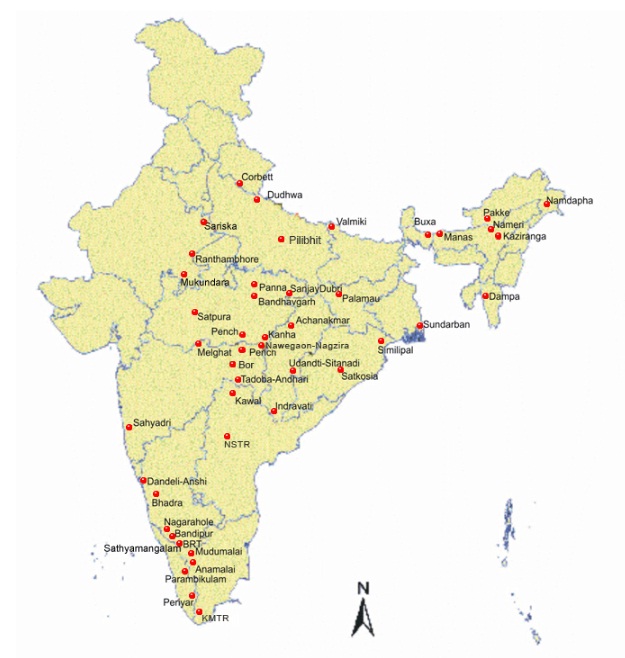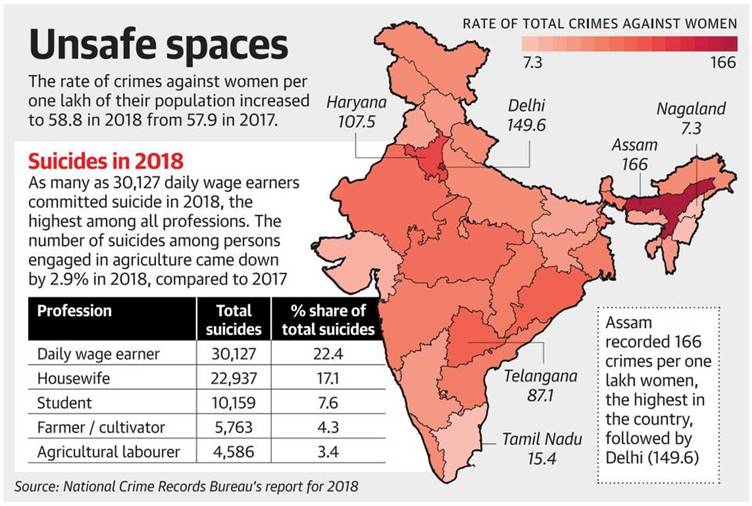



Modi govt policies hampering India’s economic growth, foreign policy: risk firm
India has been ranked the fifth highest “Geopolitical Risk” in 2020, according to a list of 10 global risks in the year ahead, compiled by the Eurasia Group.
- NDA government’s “social” policies were affecting India’s economic agenda and foreign policy image.
- The impacts will be felt in 2020, with intensified communal and sectarian instability, as well as foreign policy and economic setbacks.
- Other risks are
- U.S. governance and institutional conflicts with President Donald Trump.
- The U.S.-China trade rift
- European geopolitics
- Climate change
- Amongst the risks for India in 2020 are “sectarian conflict”, anti-CAA protests and possible violence in Kashmir, which it describes as a “powder keg” after the dilution of Article 370.
- This is the first time in many years that India has been mentioned for social and political developments. India has mostly been referred due to its economic potential in the past.
Chief Justice of India (CJI) Sharad A. Bobde said the country was already going through difficult times and an endeavour should be made to maintain peace.
- Any law passed by the legislature was anyway attached with “a presumption of constitutionality”.
- The court had listed over 60 petitions challenging the legality of the Act for hearing on January 22.
- According to them, Act shredded the nation’s basic and fundamental value of secularism by discriminating in the grant of citizenship on the basis of religion.
- Asked the court to direct the Election Commission of India to take “strict action” against the political parties “spreading false rumours and violence in the country”.
- Anti-India stand has become fashion of many students belonging to these institutions [Jamia Millia Islamia and Jawaharlal Nehru University] which, otherwise, were famous for the achievements of their legendary students”.
- Strict action by the Ministry of Information and Broadcasting against newspapers and media houses that were “spreading false information and rumours”.
- Asked the Supreme Court to declare that the CAA was “not against the spirit of Constitution of India and in no sense against any citizen of India”.
- The Bill seeks to amend the Citizenship Act 1955, by wanting to grant citizenship to illegal non-Muslims (Hindus, Sikhs, Buddhists, Jains, Parsis and Christians) from Bangladesh, Pakistan, and Afghanistan, who came to India on or before December 31, 2014.
- The Bill proposes that all such migrants will be eligible for citizenship if they came to India before December 31, 2014.
- All pending legal cases pertaining to citizenship-related matters against them will stand abated.
- The Bill says the six non-Muslim communities “shall not be treated as illegal migrants” for violating provisions of the Passport Act, 1920, or the Foreigners Act, 1946.
- The Bill reduces the mandatory requirement of continuous stay in India from 12 years to five years for “many persons of Indian origin including persons belonging to the minority community from the neighbouring countries”.
- The Bill says the amendments will not apply to the tribal areas of Assam, Meghalaya, Mizoram, and Tripura, which are included in the Sixth Schedule of the Constitution and Arunachal Pradesh, Mizoram and Nagaland that are protected by the Inner Line Permit (ILP).
A 15-member foreign envoys’ delegation arrived in Srinagar on a two-day visit to J&K and met over 100 people, including senior Valley-based politicians, top newspaper editors and grassroots representatives.
- Seeking a feedback on the ground situation post the revocation of the State’s special status
- To prevent Pakistan’s attempts of interfering or internationalise this issue
- Understand present mood and demands of the people.
- No shutdown was observed by locals nor was violence reported, unlike the time when EU parliamentarians visited.
- There was a common demand for restoration of Internet service.
- They posed pointed questions on the revocation of Article 370 and wanted to know, if Pakistan was making attempts to interfere.
- Held a closed-door interaction with a group of prominent politicians led by Altaf Bukhari, who is fast emerging as the face of the non-National Conference (NC) and non-Peoples Democratic Party (PDP) third front.
- No prominent civil society group or trade body met the envoys.
- People were hurt by the abrogation of Article 370.
- They stressed the need to restore Statehood
- Introduce domicile laws to safeguard land, and find jobs for the locals.
- They called for “immediate release of all political leaders and the youth in the Valley.”
The Forest Advisory Committee, an apex body tasked with adjudicating requests by the industry to raze forestland for commercial ends, has approved a scheme that could allow “forests” to be traded as a commodity.
- Industry needs to make good the loss of forest by finding appropriate non-forest land — equal to that which would be razed.
- It also must pay the State Forest Department the current economic equivalent — called Net Present Value — of the forestland.
- It is then the Forest Department’s responsibility to grow appropriate vegetation that, over time, would grow into forests.
- They find it hard to acquire appropriate non-forest land, which has to be contiguous to existing forest.
- Nearly ₹50,000 crore had been collected by the Centre over decades, but the funds were lying unspent because States were not spending the money on regrowing forests.
- The proposed scheme is called ‘Green Credit Scheme’.
- It allows agencies — they could be private companies, village forest communities — to identify land and begin growing plantations.
- After three years, they would be eligible to be considered as compensatory forestland if they met the Forest Department’s criteria.
- An industry needing forestland could then approach the agency and pay it for parcels of such forested land.
- This would then be transferred to the Forest Department and be recorded as forestland.
- The participating agency will be free to trade its asset that is plantation, in parcels with project proponents who need forest land.
- Encourage plantation by individuals outside the traditional forest area.
- Help in meeting international commitments such as sustainable development goals and nationally determined contributions.
- It does not solve the core problems of compensatory afforestation.
- It creates problems of privatising multi-use forest areas as monoculture plantation plots.
- Forests are treated as a mere commodity without any social or ecological character.
Activists and politicians from Goa have demanded that certain areas in wildlife sanctuaries of the state be notified as 'tiger reserve'.
- About 500 sq km area of Mahadayi, Netravali and Cotigao wildlife sanctuaries and some part of Mahaveer National Park were selected to be marked as 'tiger reserve.
- State Wildlife Board approved the proposal and it was sent to the Central Wildlife Board.
- As per National Tiger Conservation Authority's census, five wild cats were spotted in Goa in 2010.
- Carcasses of a tigress and her three cubs were found in the Mahadayi Wildlife Sanctuary.
- The National Tiger Conservation Authority is constituted under the provisions of the Wildlife (Protection) Act, 1972 for escalating tiger conservation.
- It is a statutory body working under the Ministry of Environment, Forests and Climate Change.

The National Green Tribunal (NGT) has directed the Central Pollution Control Board (CPCB) to carry out a study within four months to ascertain whether advance batch automated plants can address pollution caused due to burning of waste tyres in pyrolysis industries.
- Directed the CPCB to carry out the study with the National Environmental Engineering Research Institute and Indian Institute of Technology (IIT) Delhi.
- It is a method of recycling old tyres through a thermochemical treatment under high temperature to produce industrial oil and other matters.
- Ban on end-of-life tyres in pyrolysis industries citing non-implementation of environmental laws.
- Direct the Ministry of Environment, Forests and Climate Change, the CPCB and the State pollution control boards in consultation with other scientific agencies to develop a monitoring mechanism to ensure that waste tyres imported are verified through scientific means.
- Currently there are 678 tyre pyrolysis units in 19 States.
- Out of the 678 units, 270 were compliant with environmental norms.
- SPCBs based on direction of CPCB has started process of closing the non-compliance units.
All over the country, the harvest festival is a celebration of abundance and a time to thank Mother Earth.
- Pongal : Tamil Nadu
- Magha Bihu : Assam
- Uttarayan : Gujarat
- Saaji : Himachal Pradesh
- Maghi : Punjab
- Sankranti: Karnataka
- Harvest is a time of happiness for farmers, after many months of hard work of planting and growing the crops.
- This time of the year farmers have money and hence, they spend it on clothes and good food.
- The heroes of the big day are farm animals. They play a key role in agriculture and toil in farmers fields all through the year.
- People worship the sun and hence offer him the dish made from the first harvest of the season.
The National Crime Records Bureau (NCRB) published the annual Crime in India Report 2018.
- 3, 78,277 cases of crime against women were reported in the country, up from 3, 59,849 in 2017.
- Uttar Pradesh topped the list with 59,445 cases, followed by Maharashtra (35,497) and West Bengal (30,394).
- The conviction rate in rape-related cases stood at 27.2% even though the rate of filing charge sheets was 85.3% in such cases.
- Major share of crimes against women:
- The crime rate per lakh population, however, came down from 388.6 in 2017 to 383.5 in 2018.
- The incidents registered under the Scheduled Caste and Scheduled Tribes related Acts saw a decline from 6729 incidents reported in 2017 to 4816 in 2018.
- 10,349 people working in the farm sector ended their lives in 2018, accounting for 7.7 % of the total number of suicides in the country.
- The total number of people who committed suicide in 2018 was 1, 34,516, an increase of 3.6% from 2017 when 1, 29,887 cases were reported.
- The highest number of suicide victims were daily wagers — 26,589, comprising 22.4% of such deaths.

About NCRB:
- The National Crime Records Bureau, abbreviated to NCRB, is an Indian government agency responsible for collecting and analysing crime data as defined by the Indian Penal Code (IPC) and Special and Local Laws (SLL)
- NCRB is headquartered in New Delhi and is part of the Ministry of Home Affairs (MHA), Government of India.
- NCRB was set-up in 1986 to function as a repository of information on crime and criminals so as to assist the investigators in linking crime to the perpetrators.
Objectives of NCRB:
- Create and maintain secure sharable National Databases on crimes and criminals for law enforcement agencies and promote their use for public service delivery.
- Collect and process crime statistics at the national level and clearing house of information on crime and criminals both at National and International levels.
- Lead and coordinate development of IT applications and create an enabling IT environment for Police organizations.
- National repository of fingerprints of all criminals.
- To evaluate, modernize and promote automation in State Crime Records Bureaux and State Finger Print Bureaux.
- Training and capacity building in Police Forces in Information Technology and Finger Print Science.

© 2025 iasgyan. All right reserved